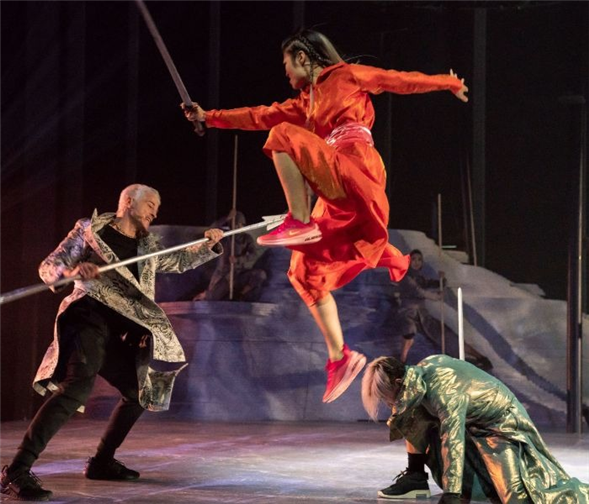Translate Page

How Hollywood screenwriters worked with an international team to create Dragon Spring Phoenix Rise at The Shed
---
The two screenwriters of the Kung Fu Panda movies, Jonathan Aibel and Glenn Berger, were confused when they got a call several years ago from Alex Poots, the artistic director of The Shed, an arts center in New York that didn't yet exist. Poots wanted them to write the script for a live stage show titled Dragon Spring Phoenix Rise, but they didn't understand what exactly it was supposed to be.
"Is it a musical? Is it an opera? Is it fighting? Is it a comedy?" Aibel remembers wondering. And moreover, why them? For the past 25 years, Aibel and Berger have worked primarily on animated TV shows (King of the Hill) and movies (Trolls, Aliens vs. Monsters). They had never written for flesh-and-blood actors on the stage before.
But Poots insisted the director, Chinese-American opera producer Chen Shi-Zheng, was interested in them. Now Dragon Spring Phoenix Rise is opening as the first big theatrical spectacle in The Shed's inaugural season -- yet its two authors still aren't sure what it is.
Their uncertainty has been a good thing, they say. "It made for a lot of creative freedom in the process," Berger notes.
Aibel agrees. "I think because we don't have a traditional theatre background, that enabled us to approach it just saying, 'What do we want to see?,' without having to say what category it fits into. So it didn't have to be a musical comedy or an opera or a Cirque du Soleil imitation. It could take elements of everything to be its own strange and crazy thing."
The only downside, Berger says, is "we don't know what to call it for friends and family."
Poots has no such trouble: "I call it a kung fu musical."
While other stage extravaganzas have featured music and martial arts elements -- Chen's own Monkey: Journey to the West comes to mind -- Dragon Spring Phoenix Rise seems to be pioneering the kung fu musical genre, with an original story integrating songs by Australian pop star Sia with assistance from The Haxan Cloak. "I don't want to claim it as the first one," Poots says. "But I don't know of any other." One thing it's not is a stage version of Kung Fu Panda. "The movies are more like family comedies in a mythic China in which animals speak," Aibel says. "This takes place in modern-day New York."
Working with Poots and Chen, Aibel and Berger fashioned a tale that spans two decades and pits the forces of good against the forces of evil. The heroes, including Grandmaster Lone Peak (Broadway regular David Patrick Kelly) and his rebellious daughter Little Lotus (Martha Graham Dance Company's PeiJu Chien-Pott), are members of the House of Dragon, which has guarded the Dragon Spring for countless generations. The villains are their betrayers, including Little Lotus' husband and father of their twins: Little Phoenix and Little Dragon. Everybody practices kung fu, and they live in Flushing, Queens.
Aibel and Berger are well aware that their script is unlikely to be what inspires audiences to buy tickets. Dragon Spring Phoenix Rise is meant to attract lovers of Bruce Lee. In fact, the seed for the show was planted when Chen brought Poots a video of Lee auditioning for the TV series The Green Hornet in 1964 to show off the beauty of martial arts. Chen expressed surprise and disappointment that, even with the popularity of kung fu movies, the art form has been rarely seen on stage in New York aside from David Henry Hwang's 2014 Bruce Lee bio-play Kung Fu and Monkey: Journey to the West.
Dragon Spring Phoenix Rise's 20 cast members hail from eight different countries and, in addition to acting, singing and dancing, they engage in elaborate, fast-paced combat sequences. There is both a movement choreographer (the U.K's Akram Khan) and a martial arts director (Chinese-born Zhang Jun, with thanks in the credits to Hong Kong film director Yuen Woo-Ping.) The performers also soar up to 80 feet in the air in three different aerial sequences, taking awesome advantage of The Shed's cavernous McCourt performance space.As an arts impresario, Poots has taken risks like Dragon Spring Phoenix Rise throughout his bold career, which includes being the founding director of the Manchester International Festival and serving as the artistic director of the Park Avenue Armory.
Appointed to lead the Shed in 2014, Poots persuaded the board of directors to embrace a mission of nurturing both emerging and established artists by premiering "original works of art, across all disciplines, for all audiences." The Shed's eight-story building reflects that ambition. Located on West 30th Street, at the head of the High Line and the foot of the new Hudson Yards neighborhood, the complex contains two theatres, two galleries and a skylight room on the top floor used for "events, rehearsals and artist development." The McCourt is the most flexible: It can accommodate a seated audience of 1,200 and more than 2,000 standing for rock concerts and the like. It can also disappear thanks to its movable shell, which retracts to create an outdoor plaza.
What can theatre lovers expect from The Shed in the seasons to come?
"A spirit of adventure and invention," Poots replies. "You would like everything to be perfect. When you're making new art, it isn't always. But when you're working with great artists, there's always something profound that you leave with."
---
TDF MEMBERS: At press time, discount tickets were available for Dragon Spring Phoenix Rise. Go here to browse our current offers.
Jonathan Mandell is a drama critic and journalist based in New York. Visit his blog at NewYorkTheater.me or follow him on Twitter at @NewYorkTheater. Follow TDF at @TDFNYC.
Top image: A scene from Dragon Spring Phoenix Rise. Photo by Stephanie Berger.